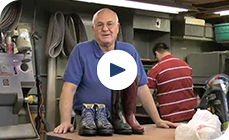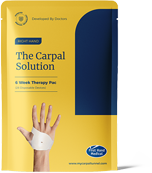My hands Feel Like Sandpaper. Is this Carpal Tunnel Syndrome?
While it is not as common, people often report their hands have lost their feeling sensation and feel rough like sandpaper or insulated from the things they touch – like there is a layer of cardboard between their skin and the objects they are touching.


By The Carpal Solution Medical Team Over 300 years combined medical experience

My hands Feel Like Sandpaper. Is this Carpal Tunnel Syndrome?
While it is not as common, people often report their hands have lost their feeling sensation and feel rough like sandpaper or insulated from the things they touch – like there is a layer of cardboard between their skin and the objects they are touching.


By The Carpal Solution Medical Team Over 300 years combined medical experience

Answers to Carpal Tunnel Questions by Expert Doctors
Anita
Spokane, Washington
Answers by Doctors At First Hand Medical
People often have strange symptoms with nerve conditions like Carpal Tunnel Syndrome. When the nerve is pinched in the narrow passage known as the Carpal Tunnel at the base of the palm it can produce a wide range of symptoms.
More classic symptoms would be hand numbness and hand pain or wrist pain, even though the Carpal Tunnel is not in the wrist. The Carpal Tunnel Anatomy is proximate to the wrist and Carpal Tunnel Syndrome can cause pain in any joint or muscle between the tips of the fingers up to the shoulder and even in the neck.
You can learn more about the symptoms of Carpal Tunnel here: Carpal Tunnel Symptoms

Less Common Symptoms of Carpal Tunnel Syndrome
While it is not as common, people often report their hands have lost their feeling sensation and feel rough like sandpaper or insulated from the things they touch – like there is a layer of cardboard between their skin and the objects they are touching.
When the nerve is pinched this loss of feeling in the hands and fingers is a natural result. It can be really frustrating.
People also commonly report a loss of fine motor skills. These are the hand/eye coordination skills that we develop in early childhood when learning to tie shoes and how to write our names with a pencil. These basic skills can go missing when Carpal Tunnel Syndrome sets in.
CTS can cause extreme frustration because we come to depend on these fine motor skills to do the most basic things. It becomes difficult and slow to get ready for work in the morning. People routinely drop things like coffee cups or a glass of water at breakfast. When you are in a hurry and your hands don’t function, it is extremely annoying.
The type of anxiety and frustration can actually make Carpal Tunnel Syndrome worse. Nerves are sensitive by design. Nerve conditions worsen with loss of sleep, stress and irritability.
So, it is best to stay calm and think rationally when faced with these frustrating symptoms. There are good answers to put these symptoms in complete remission and get back to your normal life.
Doctors have developed a nighttime stretching program that puts your worst symptoms into remission within 2 – 3 weeks and puts all your symptoms into remission for 97% of people in 6 weeks.
It is called the Carpal Solution Nighttime Stretching Treatment. Learn More Here

A List of Activities People Report Are Difficult with Carpal Tunnel Syndrome:
- Buttoning buttons
- Tying shoes
- Writing with a pen
- Putting on make-up
- Cooking
- Driving
- Opening a jar
- Turning the keys in the ignition of a car
- Twisting a door knob
- Sleeping
- Playing a Musical Instrument
- Typing
- Texting
- Picking up coins
- Holding a Coffee Cup
- Dead Bolting the House
- Shoveling snow
- Gardening
- Etc.

 Created by renowned Harvard health care professionals.
Created by renowned Harvard health care professionals. 









